- Home
- Martin Amis
Einstein's Monsters
Einstein's Monsters Read online
Einstein's Monsters
Martin Amis
MARTIN AMIS hates nuclear weapons, and he doesn't care who knows it. In fact, he wants everyone to know it. At mid-career, he has virtually ceased to be a writer of fiction-from 1974 to 1984, he published five comic novels, including the hugely successful Money-and has metamorphosed instead into a kind of anti-nuclear polemicist. Einstein's Monsters, his most recent work, is a collection of stories based on the theme of nuclear holocaust. Lest anyone think this is a chance engagement, Amis has followed up Einstein's Monsters with an article in the October Esquire railing against the insanity of American nuclear planning. The article, a rehash of the Introduction to the present volume, is most notable not for its politics but for the warning it includes to those of us waiting for the return of a depoliticized Martin Amis: "When nuclear weapons become real to you,' he tells us, "hardly an hour passes without some throb or flash, some heavy pulse of imagined super-catastrophe.' The hydrogen bomb has claimed its first English target, and it is the career of Martin Amis.
In his new role, Amis runs around like the sheriff in Jaws, as if he's the only person who knows there's a shark in town and everyone else is trying to keep the beaches open. The Esquire article gives a good sense of the fundamental cheesiness of his political thinking. The members of the Washington nuclear establishment, he says, don't mind talking about "X-ray lasers and hard-kill capabilities,' but they "go green' when the author tries to light up a cigarette. When the author interviews an attache from the Soviet embassy, on the other hand, things go differently; the two "drink a lot of coffee and smoke up a storm.' "Sergi and I got along fine,' Amis tells us. "He didn't want to kill me. I didn't want to kill him.' Amis has invented the Marlboro Peace Plan.
Einstein's Monsters is only a touch more subtle. It consists of five stories, along with both an "Author's Note' and an Introduction. In his Note, Amis vacillates upon the question of whether the stories are polemical. "If they arouse political feelings,' he tells us, "that is all to to the good,' but really, they "were written with the usual purpose in mind: that is to say, with no purpose at all-except, I suppose, to give pleasure, various kinds of complicated pleasure.'
If there is any confusion in the reader's mind, however, it is cleared up by the first story, "Bujak and the Strong Force.' Reading it, one is reminded of the experience of sitting in a college fiction workshop, the excited author right there next to you, enthusiastically explaining the intricacies of his story's symbolic order.
Bujak, the title character, is a hugely powerful Eastern European living in a bad neighborhood in London. A survivor of the Nazi occupation of Poland, he spends a great deal of time arguing with the (American) narrator over the value of revenge. The narrator is anti, Bujak is pro. Bujak polices his block, rounds up petty criminals, makes the streets safe for young ladies at night. "He was our deterrent,' the narrator says. At the end of the story, when Bujak returns to his home to find his mother, daughter, and granddaughter brutally rape-murdered, the drunken perpetrators lying asleep on the floor, we expect him to exact some terrible revenge. But he doesn't. "Why?' the narrator asks. "No court on earth would have sent you down.' (Is this how Americans speak, by the way?) "When I had their heads in my hands,' Bujak replies, "I thought how incredibly easy to grind their faces together. But no… I had no wish to add to what I found.' It's… unilateral disarmament!
Throughout Einstein's Monsters Amis the author is at war with Amis the nuclear theoretician. "Insight at Flame Lake,' for example, would have been a fine schizophrenic-breakdown story, except that Amis the theoretician felt compelled to tack on an anti-nuclear subtext. "Thinkability,' the long introduction to Einstein's Monsters, has its flashes of brilliant writing (the generations of unborn babies who would be aborted by a nuclear war are described as "queueing up in spectral relays until the end of time'), but it is marred by the same sort of simplistic reasoning that plagues the Esquire piece. Amis wants to pin all our problems on the existence of nuclear weapons. In the face of these missiles, no merely personal atrocity matters: "What vulgar outrage or moronic barbarity can compare with the black dream of nuclear exchange?' It's like asking a meter maid, "How dare you give me a ticket when there are Russian tanks illegally parked on the streets of Kabul?' But Amis the satirist knows that it takes a lot more than nuclear weaponry to explain the spiritual malaise of our century, just as Amis the writer knows (or ought to know) that there is always more than one explanation for any human phenomenon. One suspects, in fact, that Amis's opposition to the Strategic Defense Initiative is derived not from the fear of a perilous escalation in the arms race, but from a (perhaps unconscious) perception that, with nuclear weapons gone, the novelist would have to face the fact of unexcused human weakness again.
Martin Amis
Einstein's Monsters
AUTHOR'S NOTE
Some readers might like to read the introductory essay last or later. It is polemical, whereas the stories that follow were written with the usual purpose in mind: that is to say, with no purpose at all-except, I suppose, to give pleasure, various kinds of complicated pleasure. Previously I had managed only four short stories in sixteen years; these five came successively over the last two years-and then they stopped. If the stories also arouse political feelings then that is all to the good. In this debate, in this crap game, I do want to get my chip on the table, however thin, however oddly colored, however low its denomination. "Einstein's Monsters," by the way, refers to nuclear weapons but also to ourselves. We are Einstein's monsters, not fully human, not for now. May I take the opportunity to discharge-or acknowledge-some debts? In order of composition: "The Time Disease" owes something to J. G. Ballard; "Insight at Flame Lake" to Piers and Emily Read and to Jack and Florence Phillips; "The Little Puppy That Could" to Franz Kafka and to Vladimir Nabokov; "Bujak and the Strong Force" to Saul Bellow; and "The Immortals" to Jorge Luis Borges and to the Salman Rushdie of Grimus. And throughout I am grateful to Jonathan Schell, for ideas and for imagery. I don't know why he is our best writer on this subject. He is not the most stylish, perhaps, nor the most knowledgeable. But he is the most decorous and, I think, the most pertinent. He has moral accuracy; he is unerring.
M. A., London
INTRODUCTION: THINKABILITY
I was born on August 25, 1949: four days later, the Russians successfully tested their first atom bomb, and deterrence was in place. So I had those four carefree days, which is more than my juniors ever had. I didn't really make the most of them. I spent half the time under a bubble. Even as things stood, I was born in a state of acute shock. My mother says I looked like Orson Welles in a black rage. By the fourth day I had recovered, but the world had taken a turn for the worse. It was a nuclear world. To tell you the truth, I didn't feel very well at all. I was terribly sleepy and feverish. I kept throwing up. I was given to fits of uncontrollable weeping… When I was eleven or twelve the television started showing target maps of South East England: the outer bands of the home counties, the bull's-eye of London. I used to leave the room as quickly as I could. I didn't know why nuclear weapons were in my life or who had put them there. I didn't know what to do about them. I didn't want to think about them. They made me feel sick.
Now, in 1987, thirty-eight years later, I still don't know what to do about nuclear weapons. And neither does anybody else. If there are people who know, then I have not read them. The extreme alternatives are nuclear war and nuclear disarmament. Nuclear war is hard to imagine; but so is nuclear disarmament. (Nuclear war is certainly the more readily available.) One doesn't really see nuclear disarmament, does one? Some of the blueprints for eventual abolition-I am thinking, for example, of Anthony Kenny's "theoretical deterrence" and of Jonathan Schell's "weaponless deterrenc
e"-are wonderfully elegant and seductive; but these authors are envisioning a political world that is as subtle, as mature, and (above all) as concerted as their own solitary deliberations. Nuclear war is seven minutes away, and might be over in an afternoon. How far away is nuclear disarmament? We are waiting. And the weapons are waiting.
What is the only provocation that could bring about the use of nuclear weapons? Nuclear weapons. What is the priority target for nuclear weapons? Nuclear weapons. What is the only established defense against nuclear weapons? Nuclear weapons. How do we prevent the use of nuclear weapons? By threatening to use nuclear weapons. And we can't get rid of nuclear weapons, because of nuclear weapons. The intransigence, it seems, is a function of the weapons themselves. Nuclear weapons can kill a human being a dozen times over in a dozen different ways; and, before death-like certain spiders, like the headlights of cars-they seem to paralyze.
Indeed they are remarkable artifacts. They derive their power from an equation: when a pound of uranium-235 is fissioned, the liberated mass within its 1,132,000,000, 000,000,000,000,000 atoms is multiplied by the speed of light squared-with the explosive force, that is to say, of 186,000 miles per second times 186,000 miles per second. Their size, their power, has no theoretical limit. They are biblical in their anger. They are clearly the worst thing that has ever happened to the planet, and they are mass-produced, and inexpensive. In a way, their most extraordinary single characteristic is that they are manmade. They distort all life and subvert all freedoms. Somehow, they give us no choice. Not a soul on earth wants them, but here they all are.
I am sick of them-I am sick of nuclear weapons. And so is everybody else. When, in my dealings with this strange subject, I have read too much or thought too long-I experience nausea, clinical nausea. In every conceivable sense (and then, synergistically, in more senses than that) nuclear weapons make you sick. What toxicity, what power, what range. They are there and I am here-they are inert, I am alive-yet still they make me want to throw up, they make me feel sick to my stomach; they make me feel as if a child of mine has been out too long, much too long, and already it is getting dark. This is appropriate, and good practice. Because I will be doing a lot of that, I will be doing a lot of throwing up, if the weapons fall and I live.
Every morning, six days a week, I leave the house and drive a mile to the flat where I work. For seven or eight hours I am alone. Each time I hear a sudden whining in the air, or hear one of the more atrocious impacts of city life, or play host to a certain kind of unwelcome thought, I can't help wondering how it might be. Suppose I survive. Suppose my eyes aren't pouring down my face, suppose I am untouched by the hurricane of secondary missiles that all mortar, metal, and glass has abruptly become: suppose all this. I shall be obliged (and it's the last thing I'll feel like doing) to retrace that long mile home, through the firestorm, the remains of the thousand-mile-an-hour winds, the warped atoms, the groveling dead. Then-God willing, if I still have the strength, and, of course, if they are still alive-I must find my wife and children and I must kill them.
What am I to do with thoughts like these? What is anyone to do with thoughts like these?
Although we don't know what to do about nuclear weapons, or how to live with nuclear weapons, we are slowly learning how to write about them. Questions of decorum present themselves with a force not found elsewhere. It is the highest subject and it is the lowest subject. It is disgraceful, and exalted. Everywhere you look there is great irony: tragic irony, pathetic irony, even the irony of black comedy or farce; and there is irony that is simply violent, unprecedentedly violent. The mushroom cloud above Hiroshima was a beautiful spectacle, even though it owed its color to a kiloton of human blood…
In the discursive sphere there are several ways of writing badly about nuclear weapons. Some people, you finally conclude, just don't get it. They just don't get it. They are published versions of those bus-stop raconteurs who claim that nuclear war won't be "that bad," especially if they can make it down to their aunt's cottage in Dorset (or, better still, if they are already in their aunt's cottage at the time). They do not see the way nuclear weapons put everything into italic capitals. Failing to get the point about nuclear weapons is like failing to get the point about human life. This, in fact, is the basis of our difficulty.
It is gratifying in a way that all military-industrial writing about nuclear "options" should be instantly denatured by the nature of the weapons it describes, as if language itself were refusing to cooperate with such notions. (In this sense language is a lot more fastidious than reality, which has doggedly accepted the antireality of the nuclear age.) In the can-do world of nuclear "conflict management," we hear talk of retaliating first; in this world, deaths in the lower tens of millions are called acceptable; in this world, hostile, provocative, destabilizing nuclear weapons are aimed at nuclear weapons (counterforce), while peaceful, defensive, security-conscious nuclear weapons (there they languish, adorably pouting) are aimed at cities (countervalue). In this world, opponents of the current reality are known as cranks. "Deceptive basing modes," "dense pack groupings," "baseline terminal defense," "the Football" (i.e., the Button), acronyms like BAMBI, SAINTS, PALS, and AWDREY (Atomic Weapons Detection, Recognition, and Estimation of Yield), "the Jedi concept" (near-lightspeed plasma weapons), "Star Wars" itself: these locutions take you out onto the sports field-or back to the nursery.
In fact there is a resilient theme of infantilism throughout the history of nuclear management. Trinity, the first bomb (nicknamed the Gadget), was winched up into position on a contraption known as "the cradle"; during the countdown the Los Alamos radio station broadcast a lullaby, Tchaikovsky's "Serenade for Strings"; scientists speculated whether the Gadget was going to be a "girl" (i.e., a dud) or a "boy" (i.e., a device that might obliterate New Mexico). The Hiroshima bomb was called Little Boy. "It's a boy!" pronounced Edward Teller, the "father" of the H-bomb, when "Mike" ("my baby") was detonated over Bikini Atoll in 1952… It is ironic, because they are the little boys; we are the little boys. And the irony has since redoubled. By threatening extinction, the ultimate antipersonnel device is in essence an antibaby device. One is not referring here to the babies who will die but to the babies who will never be born, those that are queueing up in spectral relays until the end of time.
I first became interested in nuclear weapons during the summer of 1984. Well, I say I "became" interested, but really I was interested all along. Everyone is interested in nuclear weapons, even those people who affirm and actually believe that they never give the question a moment's thought. We are all interested parties. Is it possible never to think about nuclear weapons? If you give no thought to nuclear weapons, if you give no thought to the most momentous development in the history of the species, then what are you giving them? In that case the process, the seepage, is perhaps preconceptual, physiological, glandular. The man with the cocked gun in his mouth may boast that he never thinks about the cocked gun. But he tastes it, all the time.
My interest in nuclear weapons was the result of a coincidence. The two elements were impending fatherhood and a tardy reading of Jonathan Schell's classic, awakening study, The Fate of the Earth. It woke me up. Until then, it seems, I had been out cold. I hadn't really thought about nuclear weapons. I had just been tasting them. Now at last I knew what was making me feel so sick.
How do things go when morality bottoms out at the top? Our leaders maintain the means to perform the unthinkable. They contemplate the unthinkable, on our behalf. We hope, modestly enough, to get through life without being murdered; rather more confidently, we hope to get through life without murdering anybody ourselves. Nuclear weapons take such matters out of our hands: we may die, and die with butcher's aprons around our waists. I believe that many of the deformations and perversities of the modern setting are related to-and are certainly dwarfed by-this massive preemption. Our moral contracts are inevitably weakened, and in unpredictable ways. After all, what acte gratuit, what vulgar outrage or mor
onic barbarity can compare with the black dream of nuclear exchange?
Against the hyperinflation of death that has cheapened all life, it is salutary to return to the physics, to remind ourselves about nuclear scale. The amount of mass expended in the razing of Hiroshima was about a thirtieth of an ounce- no heavier than a centime. In accordance with Einstein's equation, a single gram assumed the properties of 12,500 tons of TNT (together with certain properties of its own). This is Jonathan Schell:
… the energy yielded by application of the universal physics of the twentieth century exceeds the energy yielded by that of the terrestrial, or planetary, physics of the nineteenth century as the cosmos exceeds the earth. Yet it was within the earth's comparatively tiny, frail ecosphere that mankind released the newly tapped cosmic energy.
Let us ignore, for a moment, the gigaton gigantism of present-day arsenals and reflect on what a single megaton could do: it could visit Hiroshima-scale destruction on every state capital in America, with about thirty bombs to spare. The Soviet arsenal alone could kill approximately twenty-two billion people-or it could if there were twenty-two billion people around to kill. But there are only four billion people around to kill. And still we pursue the dynamic rationale of the missile gap. There is no gap. We live in a Manhattan of missiles. Rather, there is no room. We are full up.
Meanwhile the debate goes on. And what kind of debate is it? What is its tone? If we look at the controversy over the Strategic Defense Initiative we find that this, for instance, is Ronald Reagan's tone: "[SDI] isn't about fear, it's about hope, and in that struggle, if you will pardon my stealing a film line, the Force is with us." No, we will not pardon his stealing a film line. And the Force is not with us. The Force is against us. In such terms, at any rate (terms that aspire to an infinite frivolity), President Reagan entrained "an effort which holds the promise of changing the course of human history," but which also, he allowed, involved "risks." Unfortunately the risk is that of ending the course of human history. "God will not forgive us if we fail," Brezhnev told Carter at the pre-Afghanistan summit. Carter liked the phrase and used it himself, with one politic emendation. "History," he said, "will not forgive us if we fail." Actually Brezhnev was nearer the mark. In the event of "failure," God might just make it, whereas history would not.

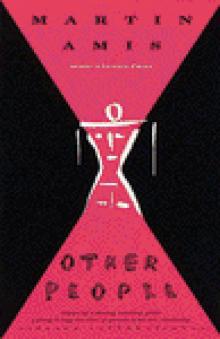 Other People
Other People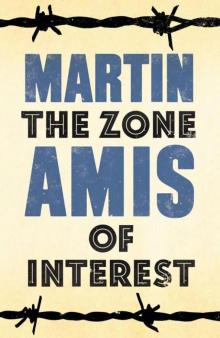 The Zone of Interest
The Zone of Interest The Rub of Time: Bellow, Nabokov, Hitchens, Travolta, Trump
The Rub of Time: Bellow, Nabokov, Hitchens, Travolta, Trump Koba the Dread
Koba the Dread Success
Success London Fields
London Fields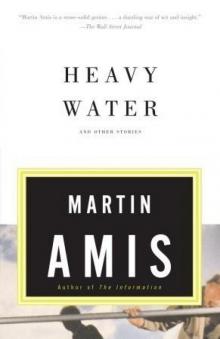 Heavy Water: And Other Stories
Heavy Water: And Other Stories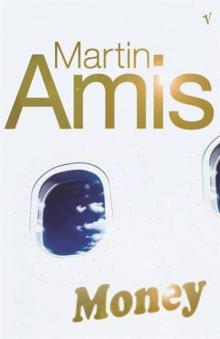 Money
Money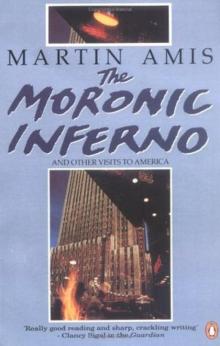 The Moronic Inferno and Other Visits to America
The Moronic Inferno and Other Visits to America Yellow Dog
Yellow Dog Time's Arrow
Time's Arrow Experience: A Memoir
Experience: A Memoir Einstein's Monsters
Einstein's Monsters The Pregnant Widow
The Pregnant Widow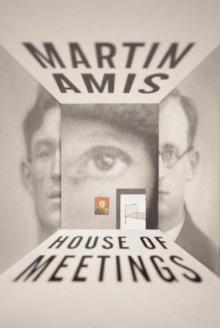 House of Meetings
House of Meetings The Information
The Information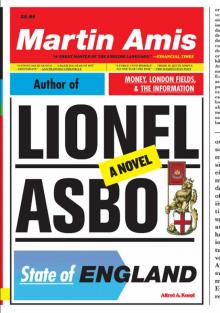 Lionel Asbo: State of England
Lionel Asbo: State of England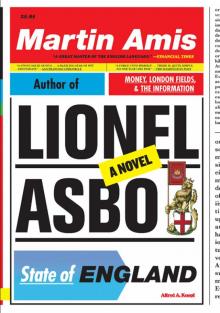 Lionel Asbo
Lionel Asbo Heavy Water and Other Stories
Heavy Water and Other Stories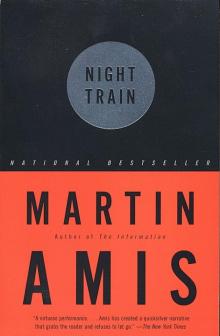 Night Train
Night Train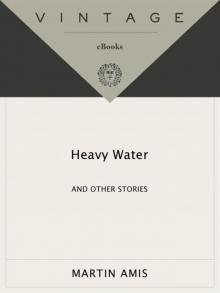 Heavy Water
Heavy Water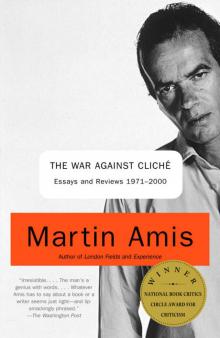 The War Against Cliche: Essays and Reviews 1971-2000 (Vintage International)
The War Against Cliche: Essays and Reviews 1971-2000 (Vintage International)